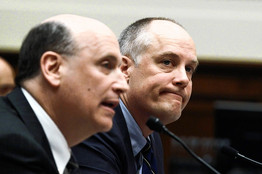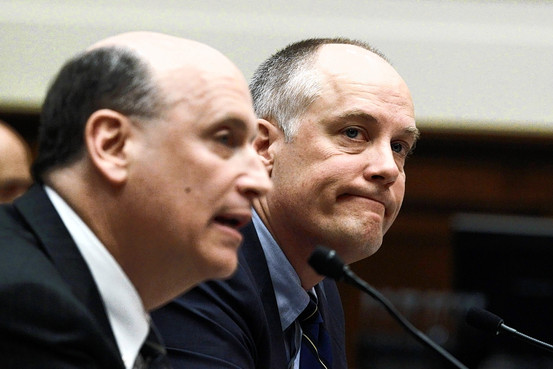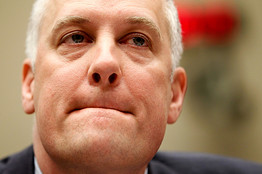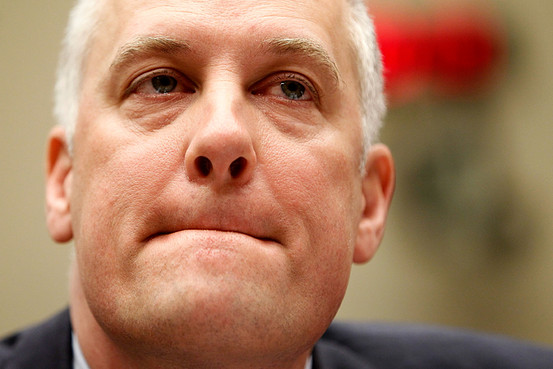By NICK TIMIRAOS
WASHINGTON—A Congressional panel heard clashing views about what caused the failure of Fannie Mae on Friday, one that blamed the "impossible" balancing act of the company's competing missions, while a former regulator blamed management failures.
"I sought to balance the fine points of mission and business insofar as I could understand them," said ex-Fannie Chief Executive Daniel Mudd before a panel investigating the financial crisis. By September 2008, when the government took over Fannie and its smaller rival, Freddie Mac, as mounting losses threatened to wipe out thin capital reserves, "that was no longer possible...and I am sorry for that," he said.
But Armando Falcon, the former head of the company's federal regulator, said the collapse of the companies "was clearly a failure of management" and reflected a "deeply rooted...culture of arrogance and greed."
Mr. Falcon asked how a business "with the most generous government subsidies possible" could be run "into the ground."
The hearing brought forward a paradox: For years, Fannie fended off efforts to restrict its growth by arguing that it had the best risk-management tools and brightest minds. But on Friday, executives said that their business model doomed their ability to manage a national and sustained housing meltdown.
Friday's session was the last of a three-day hearing on the mortgage meltdown before the Financial Crisis Inquiry Commission, charged by Congress to examine the causes of the financial crisis. Friday's session focused exclusively on the collapse of Fannie and Freddie.
The committee's conclusions, to be delivered in a year-end report, could have far-reaching influence because while legislation to revamp financial regulation is already wending through Congress, policy makers are just now beginning to consider what should be done with Fannie and Freddie, which own or guarantee half of the nation's $11 trillion in mortgages.
So far, Fannie and Freddie have required more than $126 billion in taxpayer infusions, a number that is likely to grow as mortgage defaults rise further. One of the panel's commissioners, Douglas Holtz-Eakin, a former budget analyst, said on Friday that the collapse of Fannie and Freddie would leave taxpayers with the "single largest bill we will face in this episode."
Prepared Testimony
Here is the prepared testimony from the latest three days of testimony before the Financial Crisis Inquiry Commission.
At the hearing, commissioners honed in on why Fannie executives made their ill-fated decisions to loosen underwriting standards and increase their exposure to riskier "Alt-A" loans for borrowers with good credit but little documentation of income or assets.
Fannie and Freddie's market share fell rapidly beginning in 2003 as private nonbank lenders were fueled by Wall Street's desire to bundle and sell mortgages as securities. One internal Fannie document made public on Friday showed how executives in 2005 considered a "stay the course" strategy to try to steer the market back to traditional products such as the 30-year fixed-rate mortgage.
But executives ultimately decided that new, riskier loans were "not a fad, but a growing and permanent change" in the mortgage market that the companies couldn't ignore, Mr. Mudd said. The company opted to strike a "middle course" by trying to offer less-risky versions of Alt-A loans.
"Could we really sit out?" said Robert Levin, a 27-year Fannie veteran who retired in 2008. "That's what we were grappling with."
Fannie's Alt-A loans have performed better than loans originated by private lenders, but taxpayers will likely pay a steep price for the decision to delve into them. Alt-A loans accounted for just 9% of Fannie's loan guarantee business, but represented nearly 40% of credit losses in the fourth quarter of 2009. Nearly 23% of Alt-A loans originated by Fannie Mae in 2007 were 90 days or more delinquent at the end of 2009.
Even if Fannie hadn't stepped up its exposure to the riskier loans, "they still would have taken a huge hit," said Thomas Lawler, a former Fannie economist who retired in January 2006, in an interview. "But would it have been this big? Well, good god, no."
Commissioners also focused on the degree to which government mandates to support affordable housing were responsible for the companies' increased risk appetite. At the hearing Mr. Falcon dismissed such arguments, saying, "It was driven by a desire to once again regain their dominance in the market and to try to increase profitability towards what it had been in its hey-day." He added, "This is where they thought they had to go to achieve that.
As the housing crisis deepened in 2007 and 2008, Mr. Mudd said the company increasingly faced "horrible" choices between "unsavory alternatives." Those business decisions often pitted taking on more risks to support the housing market as private lenders withdrew against joining in the retreat and precipitating far more severe damage to the market.
While they are now wards of the state, Fannie and Freddie are playing a critical role in helping to heal housing markets and, together with the Federal Housing Administration, they enable nine in 10 new mortgages.
James Lockhart, the former federal regulator who placed the companies into conservatorship in 2008, told the panel it was unrealistic to expect policy makers to design a perfectly regulated housing-finance system. "We need to take some of this and put it back in the private sector," he said.
But Mr. Mudd, who was alternately contrite but firm, said it was unlikely that a fully privatized mortgage market could be "logistically accomplished in our lifetimes."
Write to Nick Timiraos at nick.timiraos@wsj.com









![[ARENA 2]](https://cybercemetery.unt.edu/archive/fcic/20110311005349im_/http://si.wsj.net/public/resources/images/WK-AX167_ARENA__C_20110309165904.jpg)
![[ARENA 2]](https://cybercemetery.unt.edu/archive/fcic/20110311005349im_/http://si.wsj.net/public/resources/images/WK-AX168_ARENA__C_20110309165819.jpg)
![[THEATER1]](https://cybercemetery.unt.edu/archive/fcic/20110311005349im_/http://si.wsj.net/public/resources/images/WK-AX136A_THEAT_C_20110309170359.jpg)
![[VWBMW]](https://cybercemetery.unt.edu/archive/fcic/20110311005349im_/http://si.wsj.net/public/resources/images/MK-BK484_VWBMW_C_20110310174700.jpg)
![[smith]](https://cybercemetery.unt.edu/archive/fcic/20110311005349im_/http://si.wsj.net/public/resources/images/EW-AK355_smith_C_20110310120317.jpg)




Most Recommended
“I used to listen to NPR from old...;”
“Some years ago I turned NPR on...;”
“Union seniority protects...;”
“I don't get it. "Naked...;”
“Fine. so long as you and enough...;”